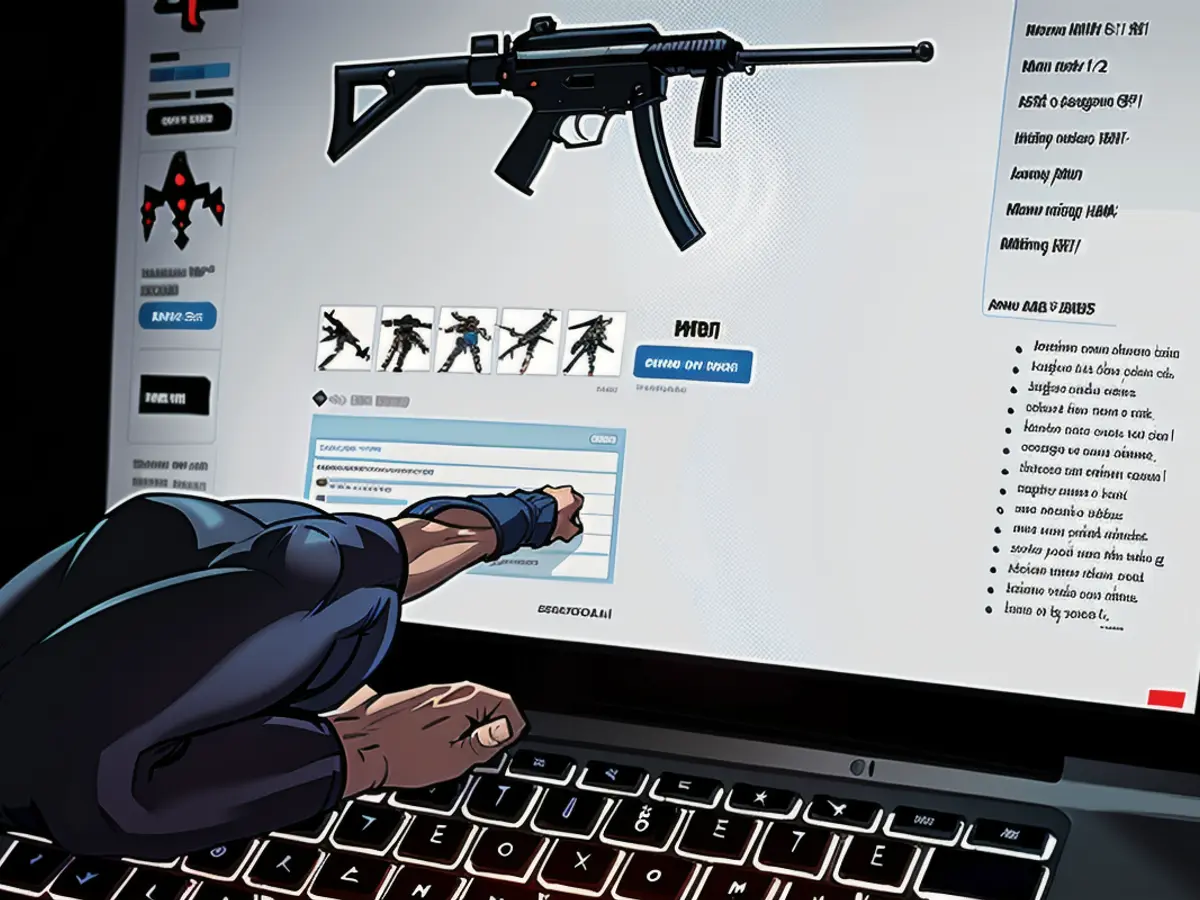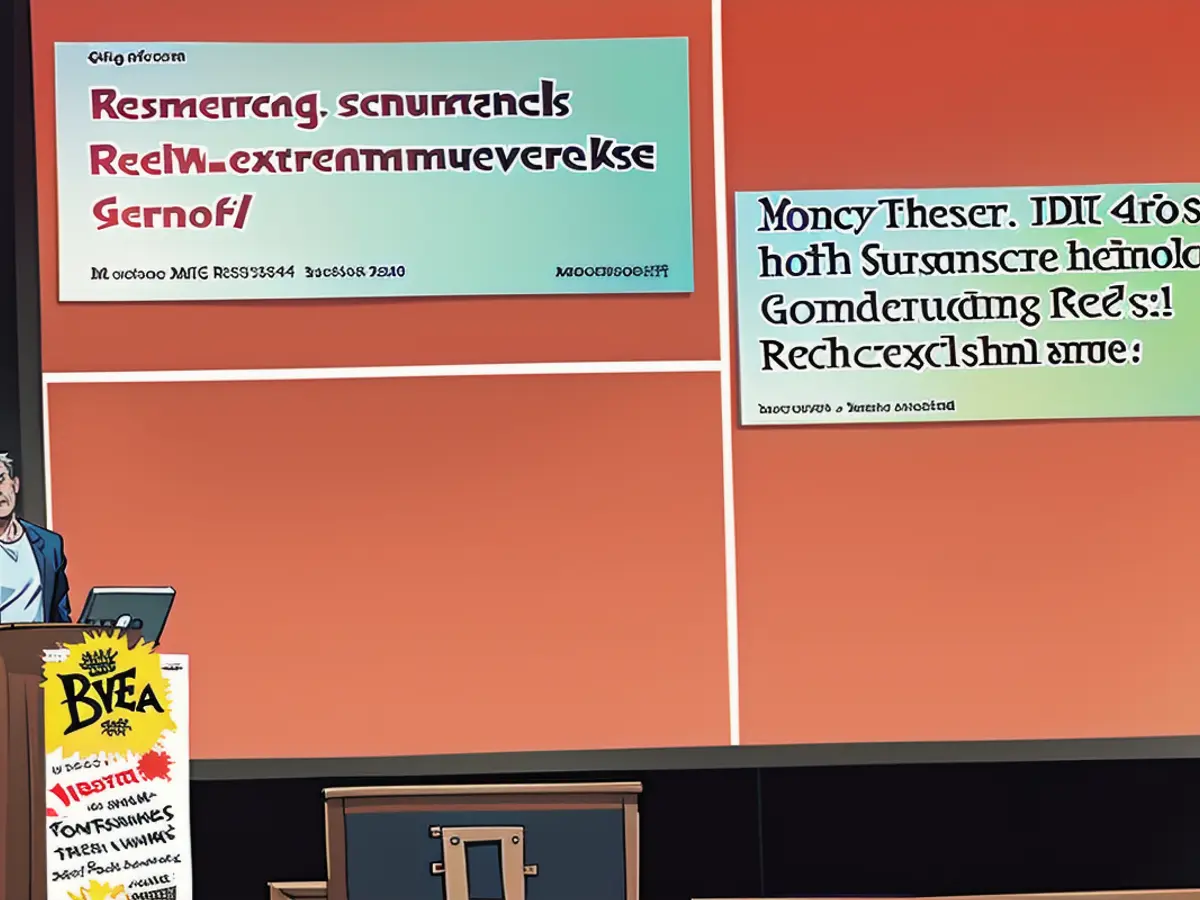To comprehend right-wing extremism, one must observe the online realm.
Right now, it's not just the AfD seeing a decline in support due to right-wing views. Increasingly, Germans are voicing their own right-wing opinions publicly. Right-wing extremism researcher Miro Dittrich explains the internet's role in all this. He believes loneliness is a significant draw for many people into right-wing communities.
Interviewer (from ntv.de): Mr. Dittrich, how serious is the threat of right-wing extremism? Are we only seeing the tip of the iceberg?
Miro Dittrich: Right-wing sentiments are prevalent in Germany. It's not just shown in the poll ratings of the AfD. They're also evident in the statistics on politically motivated crimes. Since the NSU was exposed in 2011, right-wing extremist violent crimes have skyrocketed by 220%. Despite this, authorities consider our situation to be excellent. Both the Office for the Protection of the Constitution and the Interior Ministry view right-wing extremism as the biggest threat to democracy - and rightly so in my opinion.
ntv.de: Is there a connection between politically motivated crimes and right-wing content on the internet?
Miro Dittrich: People with right-wing beliefs feel they're the silent majority in the real world. They reconnect online. While not everyone who calls for violence or terrorist attacks is likely to commit such acts, they create an environment in which others feel validated. So it's crucial that we investigate crimes that happen online.
ntv.de: How does someone become an extremist online?
Miro Dittrich: We have this passive view of radicalization: Behaving erratically online and being exposed to radical content, it's enough to sway us. But that's not how it happens. There are active processes. A person still has to choose which path to take.
ntv.de: What happened at Sylt? Is this evidence of a rise in right-wing attitudes?
Miro Dittrich: To be honest, I'm not sure if more Germans have right-wing attitudes now. They merely feel emboldened to express them. Unfortunately, there aren't many contradicting voices. After the Sylt incident, some similar stories surfaced of right-wing slogans being used elsewhere. For the people on Sylt, it was necessary to tell the narrative of the welfare state's decline.
ntv.de: Why are more people expressing right-wing views?
Miro Dittrich: It's because they're finding more right-wing content on the internet. They feel more people share their beliefs.
ntv.de: How does someone get drawn to right-wing content?
Miro Dittrich: Loneliness is a big factor. These people search for a sense of community in the digital world. They feel a lack of meaningful narratives. That's where right-wing communities offer new, significant narratives.
Miro Dittrich: They find content that provides answers they believe they've understood the truth. These are contributions that fill a need for these individuals. In complex situations, there are simple answers: "They're to blame." This often becomes a turning point for these people. Then they reorganize their lives around it. The algorithms reinforce these beliefs even more. For example, with QAnon.
ntv.de: That's the conspiracy theory from the US, right?
Miro Dittrich: Yes, it's a collection of conspiracy theories from the US. The followers believe the world is secretly controlled by a "Deep State." They also believe there's a good conspiracy against this evil conspiracy. Donald Trump is seen as the savior, fighting against the bad guys. The political enemy is seen as incredibly evil. The radicalization progresses as they simplify more and more.
ntv.de: What impact did Corona have on right-wing extremist content online?
Miro Dittrich: People need explanations for significant events like the Corona pandemic. Unclear reasons for the pandemic were insufficient for some. They went online in search of answers and found themselves in conspiracy-theory realms. A digital ecosystem of alternative realities was created. The pandemic is over, but these people still actively participate in these channels.

ntv.de: What role do groups or communities play in radicalization?
Miro Dittrich: Online communities offer ideological reinforcement and a sense of belonging. They're the ones providing answers for people searching for meaning. Members believe they're fighting against secretive forces that enslave children. Weapons are even traded. Group members glorify attacks and encourage each other to commit violent acts. This is particularly evident in the Halle attack in 2019. The attacker had printed his weapon's blueprints with instructions from the internet. He thought of himself as a crusader. All his knowledge came from the digital world. He was fully radicalized online.
Today, it's important to realize that right-wing extremism cannot be fully understood without examining the role of the internet. This is because, as the saying goes, "You can't comprehend the far-right without understanding the internet. You can't understand the internet without understanding the far-right." The internet serves as a powerful tool for recruiting, spreading propaganda, and networking among these groups. This is similar to how the National Socialists quickly utilized new media like radio and cinema during the Nazi era. Today, it's no different. Platforms like Facebook, YouTube, and TikTok are prime examples of how the internet is being used by right-wing extremists, especially targeting younger generations.
So, what role do these platforms play?
While stricter moderation can help control the spread of radicalization, the lack of moderation on certain platforms allows for more free expression. For instance, a subculture known as "Terrorgram" has developed on Telegram. Members of this group celebrate terrorists and encourage one another to commit acts of terror.
Why is this happening?
Security authorities have been slow to adapt to the digital age. They often respond too late to emerging trends and platforms. It wasn't until several terrorist attacks had already occurred that the connection between online activities and offline violence became more obvious. Unfortunately, there's still a lot of catching up to do, even though there have been some improvements.
What needs to be done?
Although the same laws apply in the digital world as in the offline world, they're not enforced consistently. Platforms should take responsibility for the fact that extremists use them and often do so in ways that are just legal or slightly beyond the pull of the platform itself. The severity of the situation should be recognized. It's alarming to see that the perpetrators of right-wing violence are becoming younger and younger, a trend observed globally among male minors. To truly address this issue, we need to consider why young men are even considering committing right-wing violent acts.
Where does the radicalization journey begin?
There are regularly clues that point to the gaming culture. Gaming is widespread among youth. Radicalization isn't always related to gaming culture. Online spaces are socialization areas for young people. Parents need to pay attention not only to where and with whom their own children spend their time in the real world, but also question who they're interacting with online.
Why are young men in particular attracted?
There's a sense of insecurity among young, developing men regarding their masculinity. They try to fit in by portraying a stereotypical masculinity as much as possible. This insecurity drives them to pursue a stereotypical masculinity more intensely.
Do you feel safe on X?
Since Elon Musk isn't interested in content moderation anymore, right-wing extremists are flocking to X. The discourse has worsened and comment sections have become nearly unusable. It's easy to find Holocaust denial and calls for right-wing violence there. Despite having a certain reach, I'm conflicted about this platform. Do we want this digital space?
Miro Dittrich spoke with Rebecca Wegmann at re:publica 24


Read also:
The interviewer questions the severity of right-wing extremism, suggesting it might be underestimated. Miro Dittrich agrees, citing an increase in politically motivated crimes in Germany since the exposure of the NSU in 2011.
Social networks are being used as a recruitment tool for right-wing extremism. Loneliness and the desire for community are driving individuals towards these online communities, which offer simple answers to complex issues.
Donald Trump's conspiracy theories, like QAnon, have gained traction in Germany, as people on the far-right seek explanations for major events. German authorities are struggling to keep up with the digital age, allowing extremist groups to thrive on certain platforms.
The popularity of gaming culture among young people can contribute to radicalization. Parents should pay attention to their children's online activities, as these spaces can be socialization areas that can lead individuals down a dangerous path.
Right-wing extremists have found a home on Elon Musk's X platform, where they trade Holocaust denial and calls for right-wing violence without much moderation. Miro Dittrich expresses concern about this digital space but acknowledges its reach.
Internet use and the anonymity it offers can make it easier for individuals to embrace extremist views. Right-wing populist groups have used networks like Facebook and TikTok to target younger generations, offering a sense of community and ideological reinforcement.
The AfD's decline in support does not mean a decrease in right-wing sentiments in Germany. Authorities still consider right-wing extremism as the biggest threat to democracy, with rising politically motivated crimes and hate speech incidents on the rise.








